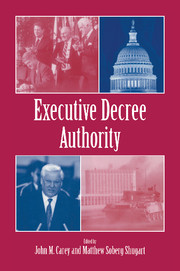Book contents
- Frontmatter
- Contents
- List of Contributors
- Preface
- 1 Calling Out the Tanks or Filling Out the Forms?
- Part I From Delegated to Constitutional Decree Authority
- 2 When the President Governs Alone: The Decretazo in Argentina, 1989–93
- 3 Presidential Decree Authority in Russia, 1991–95
- 4 Presidential Usurpation or Congressional Preference? The Evolution of Executive Decree Authority in Peru
- 5 Presidential Decree Authority in Venezuela
- Part II Constitutional Decree Authority and Conflict Between the Branches
- Part III Absence of Conflict Over Decree
- Appendix of Constitutional Provisions Regarding Decree
- References
- Index
2 - When the President Governs Alone: The Decretazo in Argentina, 1989–93
Published online by Cambridge University Press: 18 December 2009
- Frontmatter
- Contents
- List of Contributors
- Preface
- 1 Calling Out the Tanks or Filling Out the Forms?
- Part I From Delegated to Constitutional Decree Authority
- 2 When the President Governs Alone: The Decretazo in Argentina, 1989–93
- 3 Presidential Decree Authority in Russia, 1991–95
- 4 Presidential Usurpation or Congressional Preference? The Evolution of Executive Decree Authority in Peru
- 5 Presidential Decree Authority in Venezuela
- Part II Constitutional Decree Authority and Conflict Between the Branches
- Part III Absence of Conflict Over Decree
- Appendix of Constitutional Provisions Regarding Decree
- References
- Index
Summary
INTRODUCTION
President Carlos Saul Menem's tenure, which began in 1989 and is characterized by an increasing concentration of power in the executive branch, consummated in the adoption of a new constitution in 1994. Presidential expansion has not been effectively opposed by Congress, the judiciary, or other institutions. In some instances Congress itself has contributed to the concentration of power in the executive, by delegating legislative authority, for example, and by reorganizing the Supreme Court. The dominance of the Argentine president has been described as decretazo, or government by decree. What actually gave birth to the expression was the noteworthy increase in the president's use of so-called decretos de necesidad y urgencia (Need and Urgency Decrees, or NUDs). By this means the executive “passes” laws, usurping congressional law-making authority without consent. NUDs were not unknown in Argentina before Menem's presidency. Between 1853 and July 1989, approximately twenty-five NUDs were issued. Between July 1989 and August 1994, however, President Menem issued 336 NUDs. He created taxes, repealed congressional laws, and modified private contractual relations.
According to Argentine law until the constitutional reform of 1994, the president could issue three types of decrees:
rule-making decrees in the course of implementing legislation
autonomous decrees based on constitutionally endowed presidential powers
legislative decrees based on authority delegated by Congress
The first two types of decrees correspond to what Carey and Shugart call “rule making,” and the third one corresponds to “delegated decree authority.”
- Type
- Chapter
- Information
- Executive Decree Authority , pp. 33 - 61Publisher: Cambridge University PressPrint publication year: 1998
- 25
- Cited by



